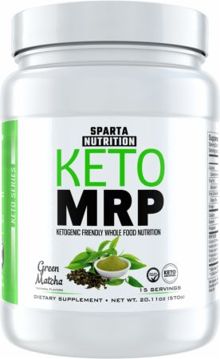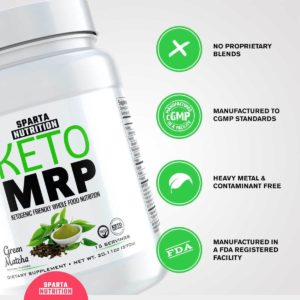The last few years have borne witness to a new trend in the fitness industry -- meal replacement powders that promise real food ingredients. A great example of a product that pioneered the trend is Rich Piana 5% Nutrition's "Real Carbs" for the carb-eaters out there. But what about the rest of us?
Fast forward to summer 2018: Sparta Nutrition unveils Keto MRP, an exciting new ketogenic take on the trend. Does it hold up to the other great products Sparta dropped in 2018?
Meal Replacements without cheap carbs
Abbreviated as "MRP", meal replacement powders are designed to do just that: replace a meal! In recent years, progressive companies have begun to shift away from traditional (and nasty) MRP ingredients like maltodextrin in favor of using honest food sources. To be real, there hasn't been much variation amongst the meal replacement products on the market barring macronutrient content or flavor profiles. And they're all still loaded with carbs - definitely not for the low-carb or high-fat ketogenic dieter!
One for the rest of us: A meal replacement with barely any carbs!
So Sparta Nutrition seeks to invigorate this fitness industry stasis via the introduction of a keto-friendly meal replacement powder. They've stayed true to the real food trend for the product as well, making it somewhat of an anomaly on the market, especially with no artificial sweeteners or flavors (wait 'til you see how they flavored this one).
For us to really get behind Keto MRP though, we need the product to deliver on a few key fronts. First, it has to only use sweeteners that won't kick us out of ketosis. Second, it has to be delicious while still packing enough high-quality ingredients to leave us full until our next meal. And for keto... it needs to be high in fat!
Does Keto MRP succeed? Let's crack into the science to find out -- but first, check into PricePlow's coupons and sign up for Sparta Nutrition news and deal alerts.
Sparta's Keto MRP Ingredients
After looking at this profile full of healthy fats and no artificial colors, flavors, or sweeteners, you'll realize two great uses:
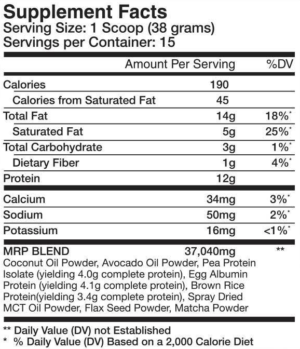
With a wonderful spread of healthy fats and no artificial colors, flavors, or sweeteners, Sparta's Keto MRP is on to something with this natural flavoring method!
- A low-calorie snack that will satisfy a craving without blowing up the diet
- When there's no time to cook a keto-friendly meal (or you desperately need groceries!) or you forgot to bring healthy food to work
- For traveling or going on the road and you're not confident you'll get enough high-fat food
-
Coconut Oil and MCT Oil
Coconut oil and its younger brother MCT (Medium-chain Triglyceride) oil are already darlings of the ketogenic community. For those that are uninformed of the royalty of the saturated fat kingdom, both oils are astoundingly healthy sources of dietary fat. Recent research shows that MCTs may boost metabolic rate while simultaneously decreasing fat mass in healthy subjects.
A ketone boost from these saturated fats!
They also may boost ketone levels more than other dietary fats[1-2] due to their dense structures that, when beta-oxidized by the body, leave it with plenty of Acetyl-CoA molecules, and you need three of those to make one ketone.
You can watch Mike, the founder of PricePlow, talk about MCT Oil and the keto diet below:Note that the ketone boost will likely only be for those already in ketosis, and those experiments were done when the oil was taken alone. Some of the other ingredients here may blunt it, but the point is, these two fats are the basis of many keto diets because of their structure.
-
Avocado Oil Powder
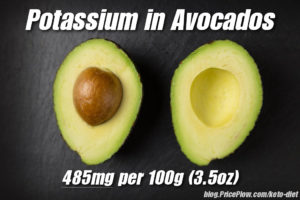
At 485mg per 100g of 'meat', Avocados often become one of a keto dieter's most important sources of potassium. But you still might find yourself coming short for the day, especially compared to your sodium numbers.
Avocado may be the healthiest source of monounsaturated fat that you can consume. Recent research connected regular consumption of avocado with improved diet quality, reduced risk of metabolic syndrome, and better food choices in dieters.[3] Avocados are a great way to take in necessary calories without relying exclusively on saturated fat sources. We're applauding the inclusion of these monounsaturated fats, as some folks in the keto community are a bit too wholly saturated fat loving for our tastes. Remember: moderation is key in everything and we need the benefits from a spread of sources, so it's good to see Sparta Nutrition spreading their sources too.
Note that we still recommend eating avocados during the keto diet, if only for the potassium! Read our article on potassium for keto dieters after you're done checking out Keto MRP.
-
Protein Sources
For those members of PricePlow nation who might question the reasoning behind Sparta's decision to include a moderate 12g of protein per serving, keep in mind that counterintuitively, dietary protein can actually knock you out of ketosis when over-consumed.[4]
![Due to its high utilization and biological value, egg protein is often used to bolster the profiles of dairy-free proteins.<sup>[5]</sup>](https://blog.priceplow.com/wp-content/uploads/protein-source-quality-300x218.png)
Due to its high utilization and biological value, egg protein is often used to bolster the profiles of dairy-free proteins.[5]
A nutritional keto diet (not a "starvation" keto diet) is all about ratios. A typical breakdown of calories needed to keep a person at a healthy weight and in ketosis is 75% fat, 20% protein, and 5% carbs, but it varies from individual to individual. This is why there is no "true" or "set" keto diet -- everyone's is a bit different!
Anyway, the protein sources included in Keto MRP contribute 25% of the calories of the product, which is a good way to keep some protein in the mix without putting your ketogenic state in danger.
A dairy-free powder!
Interestingly, they avoided the use of dairy sources entirely. Instead, the protein is sourced from brown rice, flaxseed, pea protein, and egg albumin protein. The egg white protein is included to boost the amino acid profile of the other ingredients while improving the overall "quality" as well.[5]
-
Matcha Powder
Matcha is easily one of the healthiest foods on the planet and had been a well-kept secret in Eastern cultures for centuries. The benefits of matcha are varied and impressive in all directions. For instance, matcha may improve both cognition and exercise-induced fat loss.[6,7] Consumption also improves insulin sensitivity in healthy subjects.[8]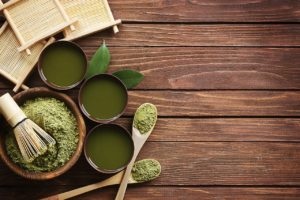
Sparta's using matcha for not only its health benefits, but for the flavor too! Not making tea this time! Image courtesy Wikimedia
This is the flavor!
Matcha is truly a multi-faceted ingredient that we're starting to realize has been underutilized by the industry. Perhaps most importantly, however, matcha is included to keep the flavor of Keto MRP 100% genuine...which brings us to the next point:
Flavors and Sweeteners
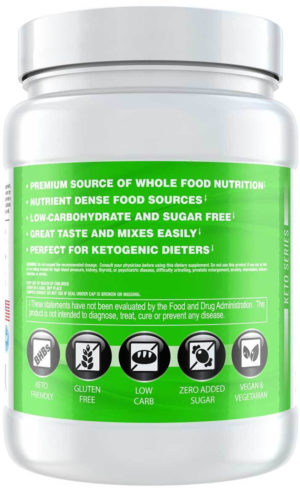
Not only low carb and zero sugars added, but Keto MRP used a very healthy blend of fats, especially if you're doing nothing but eating butter and bacon on your keto travels
As it stands now, Keto MRP is available in green matcha flavor. Sparta Nutrition claims that the flavor has to be experienced as the taste is so akin to green tea that it's mind-blowing, and if nothing else, will be one of the most unique flavors you'll ever have.
They also stuck with keto-friendly sweeteners like stevia and monk fruit. Those who are concerned about artificial sweeteners can rest easy knowing that Sparta Nutrition avoided them entirely for its new Keto Series.
Macros
Each serving of Keto MRP contains:
- Calories: 190
- Total Fat: 14g
- Saturated Fat: 5g
- Total Carbohydrates: 3g
- Fiber: 1g
- Protein: 12g
Conclusion: The Keto Market needed this!
We recommend that anyone interested in a ketogenic diet give Keto MRP a try. Having a powder on hand that you can just throw into a blender cup and consume on the go certainly beats having the foods it includes on hand at all times! Think of it this way: what's easier to carry? An avocado, a bit of coconut, matcha, and all the protein sources...or one scoop of Keto MRP?
In addition, this is something that's simply great to have in the house or at work, because nothing sucks more for a keto dieter than running out of keto-friendly food, especially if others in the house have nothing but cheap and useless carbs sitting around.The only slight hesitation we have on the product is how damn lean the calorie profile is. While 190 calories on a diet may be sufficient, 190 calories per serving falls short for athletes who need to replace a lot of calories (or are even on the Keto Gains lifestyle). In those cases, we'll be adding extra MCT oil if drinking it cold… and perhaps some actual coconut oil if drinking it warm!
But at the end of the day, this is a crazy well-designed meal replacement powder for keto dieters, and if we can kick the appetite in 190 calories and have it come primarily from fats and moderate protein, that's a huge win no matter how you slice it.
Sign up for alerts from Sparta Nutrition below, subscribe to PricePlow's YouTube channel to see the review when it comes, and check out the prices on this page!
References
- Papamandjaris, A. A., White, M. D., & Jones, P. J. (1999). Components of Total Energy Expenditure in Healthy Young Women Are Not Affected after 14 Days of Feeding with Medium-Versus Long-Chain Triglycerides. Obesity Research, 7(3), 273-280; https://pubmed.ncbi.nlm.nih.gov/10348498
- Krotkiewski, M. (2001, September). Value of VLCD supplementation with medium chain triglycerides. Retrieved from https://pubmed.ncbi.nlm.nih.gov/11571605
- Fulgoni, V. L., Dreher, M., & Davenport, A. J. (2013). Avocado consumption is associated with better diet quality and nutrient intake, and lower metabolic syndrome risk in US adults: results from the National Health and Nutrition Examination Survey (NHANES) 2001–2008. Nutrition Journal, 12, 1. https://doi.org/10.1186/1475-2891-12-1
- Ward, C. (n.d.). Amino acid metabolism. Retrieved from https://www.diapedia.org/metabolism-insulin-and-other-hormones/5105758814/amino-acid-metabolism
- Hoffman, J. R., & Falvo, M. J. (2004). Protein – Which is Best? Journal of Sports Science & Medicine, 3(3), 118–130; https://www.ncbi.nlm.nih.gov/pmc/articles/PMC3905294/
- Maki, K. C., Reeves, M. S., Farmer, M., Yasunaga, K., Matsuo, N., Katsuragi, Y., . . . Cartwright, Y. (2008). Green Tea Catechin Consumption Enhances Exercise-Induced Abdominal Fat Loss in Overweight and Obese Adults. The Journal of Nutrition, 139(2), 264-270; https://pubmed.ncbi.nlm.nih.gov/19074207
- Park, S., Jung, I., Lee, W. K., Lee, Y. S., Park, H. K., Go, H. J., . . . Rho, S. S. (2011). A Combination of Green Tea Extract and l-Theanine Improves Memory and Attention in Subjects with Mild Cognitive Impairment: A Double-Blind Placebo-Controlled Study. Journal of Medicinal Food,14(4), 334-343; https://pubmed.ncbi.nlm.nih.gov/21303262
- Venables, M. C., Hulston, C. J., Cox, H. R., & Jeukendrup, A. E. (2008). Green tea extract ingestion, fat oxidation, and glucose tolerance in healthy humans. The American Journal of Clinical Nutrition, 87(3), 778-784; https://pubmed.ncbi.nlm.nih.gov/18326618
